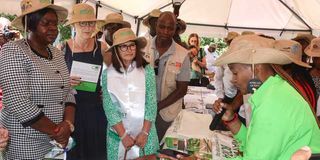EU to promote modern agriculture using tech in Homa Bay

Homa Bay Governor Gladys Wanga (left) and European Union Ambassador to Kenya Henriette Geiger are shown some of the modern agricultural practices during a farm demonstration exercise in Homa Bay town on March 11, 2024.
Most farmers will be rushing to agro-dealers to purchase inputs such as seeds and fertiliser ahead of the planting season at the end of this month and in April.
During the rush hour, some farmers will acquire inputs that are not certified. But not a group of farmers from five counties, beneficiaries of a European Union (EU) funded project which links them to dealers who provide certified farm inputs.
Homa Bay is among the listed counties where at least 9,000 farmers will benefit from the project, aimed at enhancing climate resilience in crop production.
Another 6,000 farmers will acquire training on climate-resilient agricultural practices through the programme. It involves the use of organic fertilisers, a factor that minimises the emission of carbon into the atmosphere. When preparing to plant, farmers get inputs at subsidised prices, paying only 10 per cent of the total cost of the package. All the inputs are purchased through an electronic system. Each package comprises maize, beans and fertiliser or sorghum, beans and fertiliser.
Ms Mary Okwaro recently purchased seeds which she intends to plant in Ndhiwa. She will now be accessing subsidised farm inputs through the e-voucher platform. She got five bags of seeds which she will plant in her two-acre piece of land.
"Without the programme, I would be farming at a much lesser scale," Ms Okwaro says.
All her inputs were supplied by dealers who have been approved by the programme implementers and research institutions.
EU ambassador to Kenya, Henriette Geiger, says they want to empower Kenya farmers to grow. She says the project has all the supply chain in farm production and every step has digital elements and new innovation that makes agriculture more profitable.
"This is what we need in agriculture because Kenya is largely dependent on farming. Most jobs are created through agriculture," Ms Geiger says, adding that despite agriculture being one of the key drivers of the economy in the country, a lot of youths still want to engage in white collar jobs. The programme, she says, aims to encourage youths to embrace agriculture and use crop and animal protection to earn a living.
She witnessed the launch of the BOOST project (Boosting Sustainable Food Production in Kenya), which will support farmers in Homa Bay to access farm inputs via mobile technology.
This initiative aims to promote climate-smart agriculture and green economy investments in the county. The EU is on a mission to help the rest of the world transition to a green economy. Ambassadors Sebastian Groth (Germany), Arnaud Suquet (France), Christian Fellner (Austria), Miroslaw Gojdz (Poland) and Caroline Vicini (Sweden), presided over a farm demonstration exercise in Homa Bay town on March 11,2024 where farmers in the county began acquiring inputs.
Ms Geiger says agriculture is the bedrock of the economy and the EU wants to ensure the country’s food production system becomes green and healthier for the consumer. Kenya is already in the process of transitioning to a green economy.
"We hope this will help in undertaking climate-smart agriculture that mitigates the effects of climate change," the ambassador says.
Currently, farmers from Ndhiwa and Rachuonyo North sub-Counties are the beneficiaries of the programme. Homa Bay Governor Gladys Wanga says farmers in her county are fortunate to be included among the beneficiaries.
She however asked the EU to extend the programme to Rachuonyo East to help sweet potato farmers.
"Homa Bay produces the sweetest sweet potatoes. We appeal to the programmers to include farmers in Rachuonyo East for them to get support as well," Ms Wanga said.
The governor expressed optimism that the programme will boost food production in her county and encourage many farmers to participate in food production in the county while taking advantage of the efficiency of the new technologies.
“We are grateful as a county that 3,000 are going to benefit from seeds and bio-fertilisers and 6,000 others are going to benefit from capacity empowerment on climate-smart agriculture,” Ms Wanga said.





